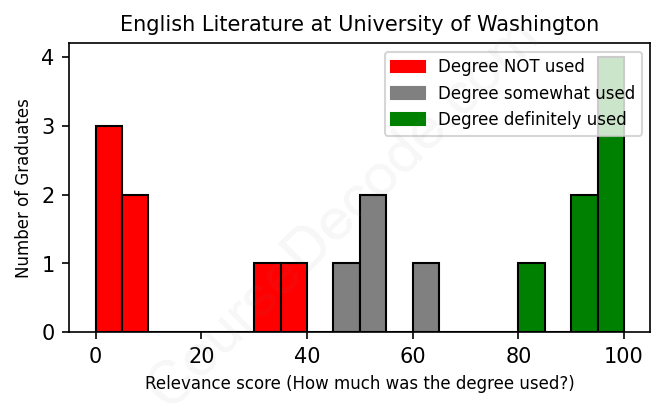
First, some facts. Of the English Literature graduates from University of Washington we've analyzed , here's how many have used (or NOT used) their degree in their career:

These are estimates based on AI analysis of 18 LinkedIn profiles (see below).
The verdict? Significantly below average. Overall, with an average relevance score of 53%, English Literature graduates from University of Washington have a much lower likelihood (-14%) of finding work in this field compared to the average graduate across all fields:
And for comparison, here's the chart for all profiles we've looked at across all degrees.
Also, after graduating, 50% of these graduates have pursued further education other than another Bachelor's degree (such as a Masters degree or other), compared to the average across all profiles of 35%. This suggests you may need more than just a Bachelors degree to be competitive as a English Literature graduate.
See the details:
|
Relevance score: 80% We think this person has gone into a career highly relevant to their degree. We think this person has gone into a career highly relevant to their degree.
DEGREE INFOGraduated in 2012 from University of Washington with a Bachelor of Arts (BA) in English Literature. Also pursued further education since (see below). JOB HISTORY SINCE GRADUATIONAssociate Attorney AB Law Office Mar 2018 - Oct 2019 Staff Attorney  Legalpad Oct 2019 - Feb 2021 Associate Attorney  CTM Legal Group Jun 2021 - Mar 2022 Contract Specialist  Floyd|Snider Mar 2022 - Present FURTHER DEGREES DONE SINCE GRADUATINGJuris Doctor (JD)University of Oregon School of Law 2014 - 2016 ABOUTNo information provided. |
The top 10 most common jobs done by the graduates we've analyzed (ranked most common to least) are:
When looking at the career paths of graduates with an English Literature degree from the University of Washington, it’s clear that their job choices are quite varied. Many of the most common roles include positions in the legal field, such as Associate Attorneys and Public Defenders, where analytical thinking and strong writing skills are essential. These jobs effectively leverage the critical reading and argumentation skills honed during their studies. On the other hand, other graduates have taken up roles in education, particularly teaching, where they can directly apply their knowledge of literature and literacy skills to foster growth in students.
However, a significant number of individuals have also ventured into jobs that seem pretty disconnected from the English Literature realm. Positions like Pizza Dude, various roles in healthcare administration, and even technical support jobs highlight this trend. While some of these roles might involve certain transferable skills such as communication or analysis, they generally don’t require a deep understanding or expertise in literature. Overall, while English Literature graduates have found meaningful ways to apply their education in legal and educational fields, many have also ended up in roles where their degree doesn’t find much relevance, reflecting the broad applicability of their skills in today’s job market.
Here is a visual representation of the most common words in job titles for English Literature graduates (this is across all English Literature graduates we've analyzed, not just those who went to University of Washington):

When looking at the career trajectories of English Literature graduates from the University of Washington, it seems like there’s quite a mixed bag. For many, their first jobs after graduation appear to be somewhat unrelated to their degree. For instance, one recent grad became a "Pizza Dude," while others took on roles in customer service or administration. However, some have found their way into more relevant fields like law or education early on, highlighting that pursuing an English degree can lead to opportunities in teaching or legal work.
Fast forward five to ten years, and it’s interesting to see a few patterns emerge. Several graduates transitioned into more stable and noteworthy roles, especially within the legal profession, where a good chunk of them ended up as attorneys or legal specialists. Others found their niche in education, becoming teachers or education administrators. Yet, there are also graduates still in jobs that are quite detached from literate pursuits, such as managerial or customer service positions. Overall, while some have carved out successful careers that tie back to their English Literature studies, others seem to have taken a more winding path that doesn’t directly relate to their degree. It’s a vivid reminder that the journey after college can take many forms!
A Bachelor’s degree in English Literature, whether at the University of Washington or elsewhere, can be pretty challenging, but it really depends on your interests and strengths. If you love reading and analyzing texts, you might find it enjoyable and less difficult than other fields. There’s a fair amount of writing and critical thinking involved, including essays, presentations, and discussions about literature that span various cultures and time periods. Some students find the workload to be substantial, especially during finals or major projects, but if you're passionate about the subject, it can feel rewarding rather than overwhelming. Overall, it’s not necessarily harder than average, but it does require dedication, good reading habits, and an eagerness to engage with complex ideas.
Most commonly, in the LinkedIn profiles we've looked at, it takes people 4 years to finish a Bachelor degree in English Literature.
So, looking at the job trajectories of these English Lit grads from the University of Washington, it's a bit of a mixed bag when it comes to money. Some folks, like the ones who became attorneys or moved up the ranks in healthcare, seem to have snagged some decent earning potential, especially in roles like Director or Associate Attorney, which typically pay pretty well. On the other hand, there are graduates who have stuck with roles that, while valuable, might not be as lucrative—like teaching or working as a pizza dude. Overall, it seems like a handful of them are likely making good money, especially in professional sectors, while others are probably earning more modestly. It definitely shows that what you do with your degree can lead to very different financial outcomes!
Here is a visual representation of the most common words seen in the "about" section of LinkedIn profiles who have a Bachelor degree in English Literature (this is across all English Literature graduates we've analyzed, not just those who went to University of Washington). This may or may not be useful:

Here are all colleges offering a Bachelor degree in English Literature (ordered by the average relevance score of their English Literature graduates, best to worst) where we have analyzed at least 10 of their graduates: